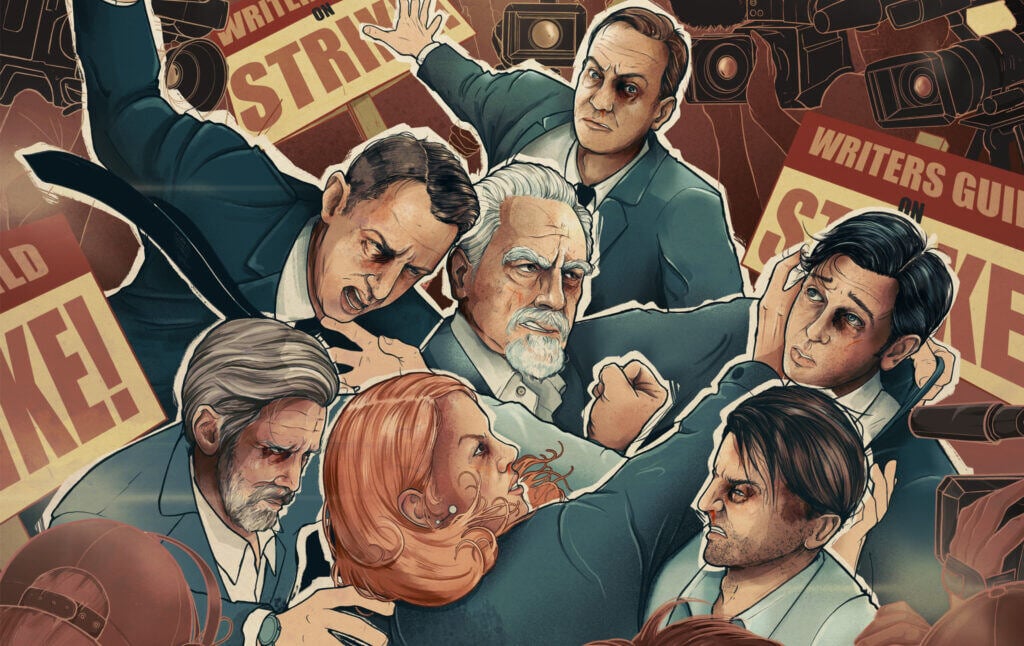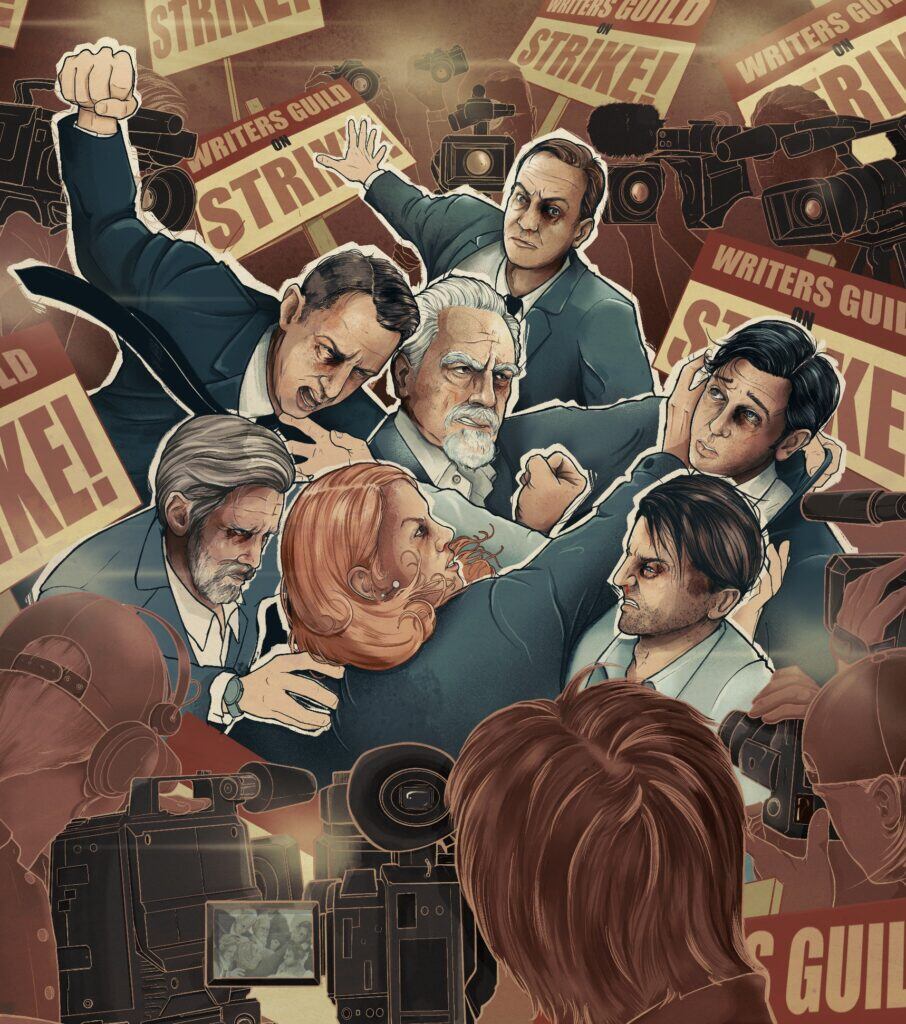
Why Media Conglomerates are Spoon-Feeding Us Anti-Capitalism
Media companies are happy to sell us anti-capitalist messages in our TV shows, as long as they don’t have to give up power or wealth to the people making those shows.
Like so many kids influenced by the 1977 film Star Wars: A New Hope, I once wanted to grow up to be a Jedi. The age-old battle between good and evil, the Force, the badass space-laser swords—all of it convinced my 7-year-old self that the life of a Jedi was something worth striving for. Even after coming to the galaxy-shattering realization that this probably wasn’t a viable career choice (although I’m still holding out), I have maintained a general interest in the film series all the way into adulthood.
It’s no secret that George Lucas loosely based the original trilogy on the American war in Vietnam. In The Return of the Jedi, the wicked Empire battles against the forested planet-moon Endor, whose inhabitants use guerilla-like tactics. However, it’s also true that Lucas’ main cast of characters, including Luke Skywalker, Obi-Wan Kenobi, and Princess Leia, aren’t exactly the every-people of the galaxy. Leia, of course, is royalty, and Luke and Obi-Wan are the wielders of overwhelming unnatural abilities as well as arbiters of justice. Allusions to American imperialism aside, Star Wars was always about those miraculously “chosen” to save and lead the common folk. This is the Star Wars I grew up with.
Imagine my surprise, then, that Disney’s latest addition to the Star Wars universe, Andor, contains no Jedi or magic powers and focuses on a group of relatable, everyday people. Over the course of the series, we watch the titular character Cassian Andor struggle against the oppressive systemic structures of life under the Empire. On his home planet of Ferrix, he and his allies clash with an inter-planetary corporation that receives police and military aid from the Empire in an all-too-real depiction of the cozy relationship between capital and the state. Over the course of the show, Cassian is slowly radicalized, and he openly joins the Rebellion in the final episode.
The Walt Disney Company is one of the largest and most powerful media conglomerates in the world. Its shareholders rely on the stability of the status quo to receive a return on their investment. So what interest would Disney have in portraying and criticizing capitalism and state brutality? Quite simply, profit—the one true aim of a capitalist media studio. Disney has jumped at the bit to cannibalize popular sentiments in the name of shareholder interests.

Unsurprisingly, Andor is not alone in its defiance. In recent years, household streaming services have released swaths of content critical of capitalism and its vestiges, colonialism and imperialism. Succession, The White Lotus, and Beef are all examples of the very latest in leftist media. Beyond TV series, film examples abound: Glass Onion: A Knives Out Mystery, Infinity Pool, The Menu, and Sorry To Bother You all espouse similar attitudes. Each has been a large scale production, with budgets in the millions of dollars, complex set design, and lengthy run times. Vast amounts of resources are being poured into projects that call into question some of the fundamental underpinnings of modern life.

There is a distinct sense of class antagonism in this type of media. The poor clash with the decadently rich, those with opportunity step over those with none, and the economically disadvantaged suffer the consequences of wealthy people’s actions. In Succession, meek cousin Greg has his last $20 taken from him by his billionaire cousin for a couple of Cokes and candy bars in the hospital waiting area. At first, he’s nothing but an errand boy, a pawn in the game of succession who is ostensibly homeless while he clamors for a little bit of goodwill from his distant relations. Similarly, you can look to the character of Kai in The White Lotus. Kai, a Native Hawaiian, is convinced by a more privileged resort guest that it is a good idea to steal from the safe of an empty room in the name of “getting back at the colonizers” and helping his struggling family. When the attempted theft goes wrong, Kai is escorted to prison and isn’t seen or heard from again for the rest of the show. It’s implied that he will pay for this act for years to come. In both cases, the wealthier characters impose dire consequences on someone of a lower standing. These types of situations occur daily in the U.S. and are a product of an unequal distribution of wealth and privilege.
Another strand of commonality that runs through each of these works is the concept of discontentedness. To put it succinctly, no one is happy in these shows. From the mental health crises and ideations of suicide in Beef, to the desperate familial battle for power and approval from the Roy patriarch in Succession, to the internal turmoil and dissatisfaction in the hearts of each of the wealthy guests in The White Lotus, alienation worms itself inside their thematic cores. Given today’s own mental health crisis, it’s no surprise these series are pointing to a general dissatisfaction with modern life, which includes loneliness, uncertainty, and nepotism.
At their essence, these streaming products tell stories of life under capitalism. They challenge their viewers to ponder the contradictions and destructiveness of the system. That is why they can be considered anti-capitalist. The companies that green-light, bankroll, and platform these series rely on and support the tenets of capitalism for continued profit, yet are producing content that would appear to foster direct opposition to their interests. Why?

Surely, no one flipped a magic switch that suddenly transformed streaming studios into capitalism-hating idealists overnight. If the incentives for producing any type of content have remained constant, then what has changed? The audience. The viewers that companies are attempting to appeal to have shifted: the goal isn’t to have mom and pop stick around after their favorite nightly cable news program for whatever version of NCIS is having its moment, and to have them watch as many advertisements as possible. Demographics and political leanings have metamorphosed, and if media conglomerates are going to maintain profitability, they better figure out how to appeal to this new audience, and fast. The proliferation of anti-capitalist streaming content is a trend, the same as the variety of true crime shows your parents watch every night or game shows offering large cash prizes that your grandparents adore.
The reality is that anti-capitalist media is plugging itself into a lucrative market: that of people ranging from 18 to 35. There are two key pieces of evidence that highlight why streaming companies have been incentivized to fund and distribute anti-capitalist media. First, data from the Pew Research Center indicates that 6 in 10 young adults primarily use online streaming to watch television. Gone are the days of adjusting the TV antenna, setting the DVR, or 3-minute long local commercial breaks. Of course, young people are only going to continue to pay the monthly subscription fees if they feel the available media is relevant.
This brings me to research from Data for Progress, which tells us that younger voters are more likely than older voters to be progressive and therefore possibly skeptical of capitalism. Additionally, the old truism touted by suburban dads across the country that “you’ll become more conservative as you get older” appears to be rapidly diminishing. So, not only do streaming platforms see it as their best interest to green-light anti-capitalist content now, but they will continue to do so in the future. Buckle up for a lot more arrogant rich people and space communism, folks.
As it turns out, there’s as much profit (if not more, currently) in anti-capitalism as there is in pro-capitalism (or simply not addressing its existence at all). Ironically, anti-capitalism, in fact, is its own market! Why would a capitalist actively contribute to the popularization of anti-capitalist sentiment? As has been written in this magazine before, this is because “the only actual capitalist value is generating and accumulating profit.” Why would the CEO of Netflix be bothered if a piece of media chronicles the ways greed corrupts the rich and degrades the poor if it generates shareholder value? In their eyes, they’re simply doing their job, and doing it well.

It’s important to note that this is not the first time market forces have incentivized corporations to cannibalize counterculture in the name of the almighty dollar. In fact, such cannibalization is intrinsic to the nature of capital itself. In his book The Conquest of Cool, Thomas Frank explains that following the popular radicalism of the 1960s and the spring of originality it inspired, corporations co-opted those very ideas to “sell T-shirts.” Personal liberation became synonymous with fashion and a sense of uniqueness attained by purchasing the correct products. While the style may not be as universally “in” as it once was, it’s possible to dress “punk” by shelling out hundreds of dollars to a variety of designer brands. The original punk aesthetic, which was achieved through plenty of second-hand thrifting and DIY trial and error, has been mainstreamed into a sanitized, corporate-approved bastardization of the authentic concept.
When this lens is applied to media, as Frank teaches us, we find that “commercial fantasies of rebellion, liberation, and outright ‘revolution’ against the stultifying demands of mass society are commonplace almost to the point of invisibility in advertising, movies, and television programming.” Take two of the 1980’s most admired mainstream films, Ferris Bueller’s Day Off and The Breakfast Club. They’re classic tales of rebellion against the authority of adults and finding a sense of identity amid the drollery of everyday teenage life. These “commercial fantasies” harnessed the dissatisfaction of life in the supersized shopping malls of 1980s America and the desire to have a greater purpose than that of a cog in the machine. Today, modern streaming studios have taken a page out of the same book and are producing content critical of the failures of modern capitalist society, albeit from a more structural perspective. The play is the same: assimilate rebellion and the desire for change, and turn a profit.
The correlation between anti-capitalist media and corporate profitability is not the whole story, though. The multiplicity of anti-capitalist streaming media has coincided perfectly with the largest Writers Guild of America action since 2008. On May 1, the WGA, which represents nearly 12,000 writers in the television, movie, and radio industries, began to strike. The strike shows that the conditions that have generated interest in anti-capitalist media—general economic precarity and unfair pay, for instance—not only degrade the quality of your favorite weekly series but also affect the very writers who create that media.
Following the television industry’s shift from its cable-only model to one that includes streaming, studios’ compensation policies for residuals were not updated. Residuals, or the payment that writers receive for their work when it is rerun or used elsewhere, are close to nonexistent now. Studios have refused to equate the number of times a show has been streamed with some form of residual pay structure. The call for parity between broadcast and streaming residuals is no less than a call for fair treatment and profit sharing. What was once a job that guaranteed a reliable income has severely atrophied in the last ten years. Writers’ pay has decreased by 23 percent over the last decade, when adjusted for inflation. Meanwhile, the CEO of Warner Bros. Discovery, David Zaslav, received a pay package of nearly $250 million in 2021.
On top of a downward slide in residual payments, the last ten years have borne witness to the increased gig-ification of the screenwriting industry. Like the taxi or food delivery industries, screenwriting has transformed from a stable job boasting a guaranteed reliable income into a one-time contract ridden crapshoot. As the number of episodes in a given season has decreased, and the wait in between seasons has increased, writers have learned to expect their periods of employment to be shorter and shorter. Writer’s rooms are more and more commonly staffed by freelancers than by full-time employees. The atmosphere which gave 30 Rock its spirit almost 20 years ago has nearly disappeared.

Additionally, with the recent rise of language-based AI models such as ChatGPT, there are escalating concerns that streaming studios will use AI in the future to write parts of scripts, thereby cutting down on available work for screenwriters. In its list of demands, the WGA seeks to limit such invasive usage. In many ways, WGA’s fight mirrors the battles Uber drivers and DoorDash deliverers are waging against Silicon Valley. Like workers in these already “disrupted” industries, screenwriters are facing off against an ever-increasing tide of cost and corner cutting in the name of shaving a little bit more off the top for investors.
It’s no coincidence that a spike in anti-capitalist streaming has coincided with an enormous WGA push for fairer working conditions. Like everyone else, screenwriters have been swept up in the enormous swell of rising income inequality. Like millions of Americans left in its wake, the writers of the WGA are hurting. Simply put, writers are creating shows with anti-capitalist themes because these themes reflect the problems they themselves face and the pervasive struggles they perceive others to be dealing with. If you’ve ever worked in the service industry, then you know what it feels like to be treated poorly by entitled, rich customers and paid a pittance of whatever they just spent. Myriad people grapple with that every day, and it’s reflected in the rage-inducing actions of the ultra-rich in shows like The White Lotus, Succession, or Beef.

If media companies are incentivized by profit to release anti-capitalist media, and the screenwriters are incentivized by modern economic and social conditions to create them, then what we have is a perfect storm of willingness on both ends. One side is attempting to tell stories about life under capitalism, and the other is trying to turn those creations into corporate cash cows. It’s quite the catch-22 for our allies in the screenwriting industry. There exists some further irony in the fact that the more these companies profit and expand their powers, the easier it is for them to uphold capitalist conditions. Capitalist conditions, of course, will inspire more anti-capitalist media and on and on in a seemingly never-ending loop.
The culmination of all the effort, time, and money set aside by writers and their corporate backers to create anti-capitalist media products is that they are quite entertaining to audiences, and well regarded by critics. Taken as a group, the four series boast an average 83 percent audience score, and a 95 percent critic score on Rotten Tomatoes. Due to their popularity, it’s likely that even if you haven’t watched a single one of these series, you’ve heard of them via social media or the internet broadly. Now more than ever, people are being exposed to anti-capitalist themes and sentiments in extremely mainstream packages.
It’s my belief that this is a good thing. Art has always been a vehicle for learning, and the more people who come to understand that our economic and political systems were designed by a slim minority, for a slim minority, the better.
However, it’s important to note that typically, these stories are presented in a manner that is descriptive rather than proscriptive. At the end of the first season of The White Lotus, there is no call to action. At the end of Succession, the Roys may end up unhappy, but there is no hope of an end to the Waystar Royco enterprise itself. There is never a roadmap for what to do. Instead, you’re left with a less than flattering depiction of the rich and the ways in which they heave their personal baggage onto the shoulders of those paid peanuts to cater to them.
What does that leave us with, then? Their description of life under capitalism is meant to be entertaining. This is, surely, the point of a television show. One of the ways this category of TV entertains is by manufacturing feelings of outrage, anger, and hopelessness. It’s easy, and possibly quite satisfying, to be frustrated with how unbelievably out of touch the Roy family is in Succession, or at how tragic it is that Danny’s immigrant family can’t catch a single break in Beef. You feel indignant at the end of an episode, but you aren’t given a useful way to direct your indignation. Because of the passive nature of TV consumption, it’s almost effortless to allow episode after episode pass you by in a thoughtless binge-fest.
The answer is to direct these feelings towards action. Watch these series with friends and family, and talk about what can be done about the problems presented in them. Organize. Show up and support the WGA at the picket line. Read the collected works of Noam Chomsky. If someone you know is being exposed to leftism through these pieces of media, provide them with a purpose.
Whatever you do, be part of the struggle against faceless corporations that profit off of stories about the inequalities they themselves are guilty of advancing.




